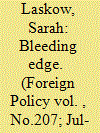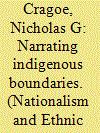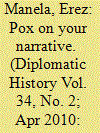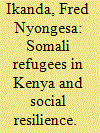| Srl | Item |
| 1 |
ID:
132442


|
|
|
| 2 |
ID:
153599


|
|
|
|
|
| Summary/Abstract |
This article examines two narrative case studies, one biography and one traditional indigenous story, as they inform the dynamics of community, politics, and nationhood for Anishinaabe indigenous people in northern Minnesota. The narratives both provide power and legitimacy to Anishinaabe national identity but inform different political projects of decolonial and postcolonial nationalism, respectively, complicating both settler and indigenous attempts to define indigenous nationhood in a way that is fixed and static. This finding is used to critique the dominant nation-state centric notions of nationhood and to propose alternative modes of understanding nationhood in the context of indigenous politics.
|
|
|
|
|
|
|
|
|
|
|
|
|
|
|
|
| 3 |
ID:
095527


|
|
|
|
|
| Publication |
2010.
|
| Summary/Abstract |
When Dr. Viktor M. Zhdanov, Deputy Minister of Health of the Soviet Union, arrived in Minneapolis, Minnesota, in May 1958 to attend the annual meeting of the World Health Assembly (WHA), the governing body of the World Health Organization (WHO), the visit was not routine.1 Reflecting Soviet premier Nikita Khrushchev's new policy of "peaceful coexistence" with the West, it marked the first time that a Soviet delegation had been sent to that forum since the establishment of the WHO ten years earlier.2 And Zhdanov made his mark, calling on the organization to launch a global campaign to eradicate smallpox, one of humankind's oldest and deadliest diseases. Mindful of the meeting's venue, he began his call with a quote from a letter that U.S. president Thomas Jefferson had written to Edward Jenner, discoverer of the smallpox vaccine, more than a century and a half earlier. The discovery, Jefferson had written the English physician in 1806, would ensure that "future nations will know by history only that the loathsome small-pox has existed.
|
|
|
|
|
|
|
|
|
|
|
|
|
|
|
|
| 4 |
ID:
163395


|
|
|
|
|
| Summary/Abstract |
Refugee camps are often perceived as unproductive places that waste people’s potential. What is left unremarked in many refugee accounts, however, is the positive side of camps. Highlighting suffering alone raises academic curiosity as to what keeps camps in protracted situations going for so long. Drawing on the notion of social resilience, this article highlights the multidimensionality of camps as social worlds by showing how the attachment through kin-based networks between Somalis at Dagahaley refugee camp in Kenya and their relatives in diaspora animated collective imaginaries about better futures in Minnesota. The article contributes to migration and humanitarian debates by arguing that refugee longings for onward migration is linked to places with a potential for kin-based support as opposed to random Western destinations, as is often highlighted in the media.
|
|
|
|
|
|
|
|
|
|
|
|
|
|
|
|